Write Us
We are just a call away
[ LET’S TALK AI ]
X
Discover AI-
Powered Solutions
Get ready to explore cutting-edge AI technologies that can transform your workflow!

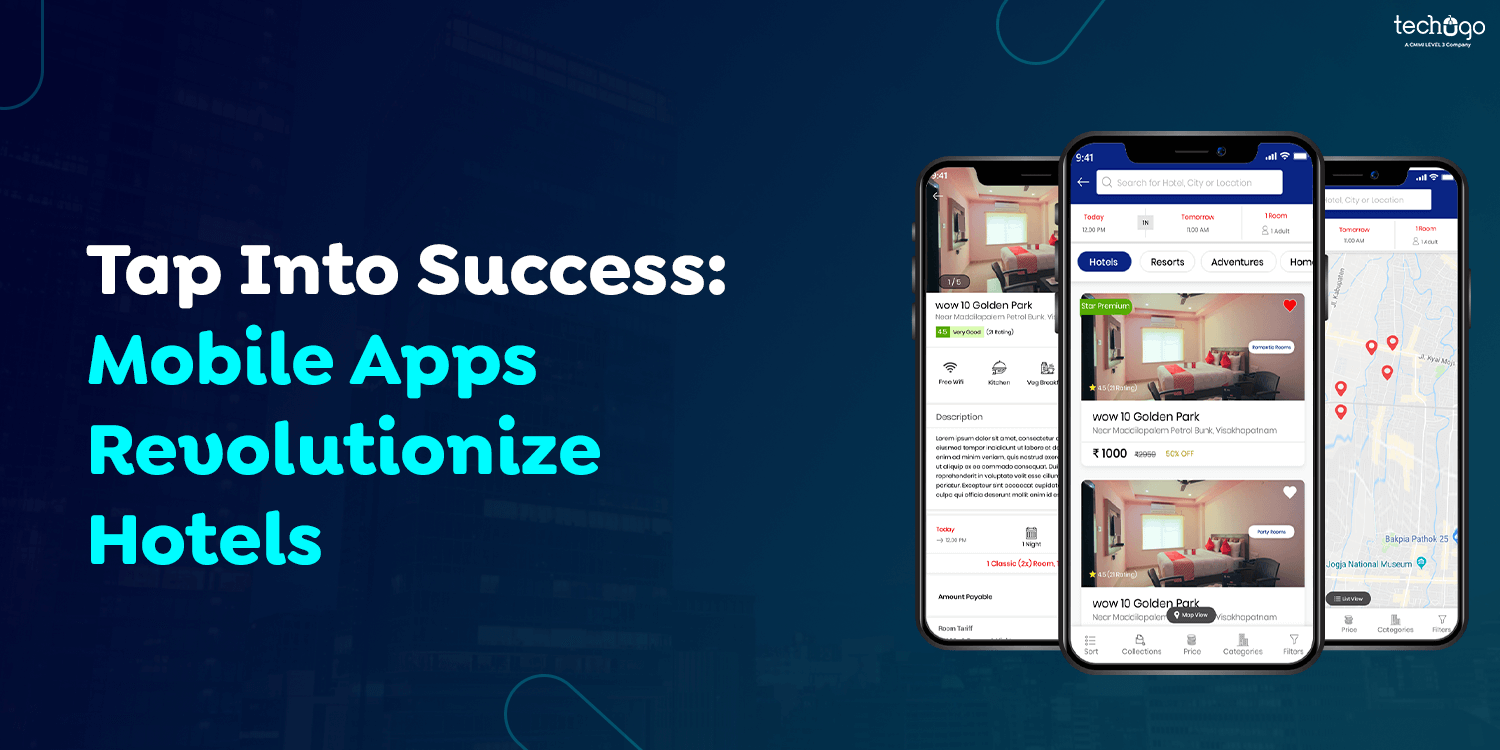
In the constantly evolving hospitality industry, organizations always face challenges giving guests top-notch experiences. Running a profitable operation demands flexibility and the ability to change. Still, some hotels are unable to stay ahead of their competitors. The claim isn’t only based on speculation.
Are you sick of your typical hotel experience? Gone are the days when your contact with hotels was restricted to registering at the desk and relying on concierge services for all your needs. It’s a new time of hospitality where Hotel Booking App Development is changing our hotel experience and improving our overall Hotel experience.
In the modern, fast-paced field of hospitality, where customer satisfaction and efficiency are the most critical factors, mobile applications have quickly become practical tools for streamlining operations, improving guest experiences, and driving business growth. From booking reservations to accessing customized services, mobile applications have changed how restaurants, hotels, and travel agencies interact with their clients.
Just Read : Developing Your Own Self-Check-In Hotel Booking App: A Comprehensive Guide
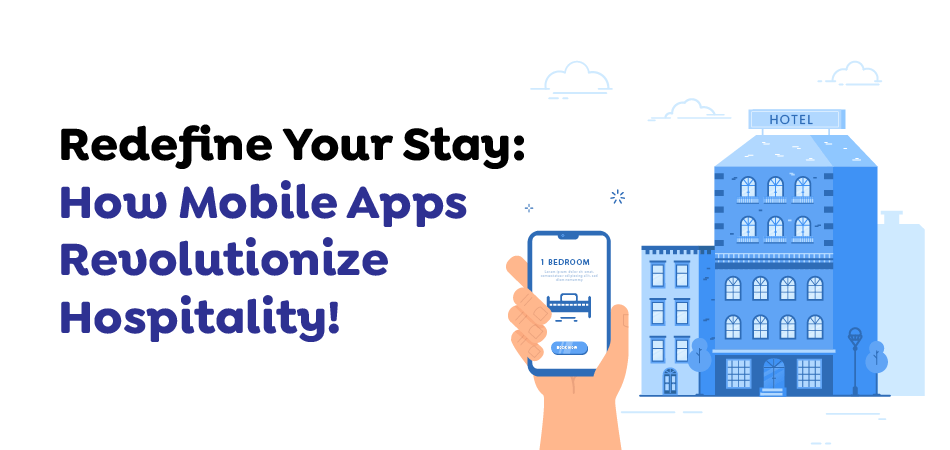
However, what effect does advance technology of mobile have on the hospitality sector? Which hotels and resorts are making use of mobile apps to promote branding, loyalty of guests marketing, cross-selling, marketing, and more? Let’s look at the various ways the hospitality industry utilizes mobile technology within the hospitality industry and applications to provide more satisfying services to their customers.
According to the report, 73% of the respondents indicated they are willing to download an app for hotels, and nearly two-thirds prefer to check in or out via the app. However, despite this apparent demand, just 38% of the respondents reported that they use applications for hotels. There is a vast discrepancy between the customer’s expectations and the industry’s offerings. The mere fact of developing an app isn’t enough to persuade people to install it – it has to provide genuine benefits to the time they spend.
Here are some examples of ways mobile solutions will address the most pressing challenges that the industry and guests confront:
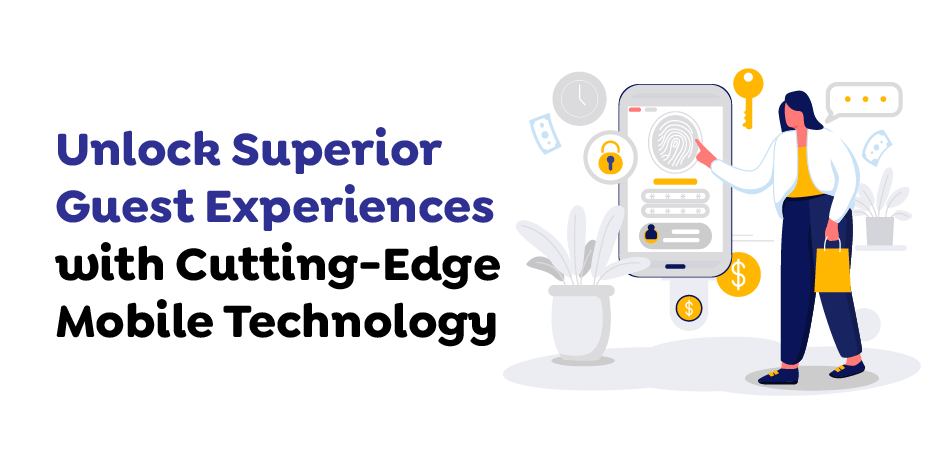
The convenience of mobile check-in solutions removes the huge, lengthy obstacle for guests. It permits guests to skip the line for check-in and head directly to their room. There is no need to spend time waiting in lines for hours at the reception desk. Guests can check in anytime within the resort, even when they arrive.
Also Read : Doctor On Demand App Development: Tech Stack, Cost, Features, Etc.
In addition, mobile check-in services can be utilized to generate additional income. The same place where guests check into hotel rooms can provide guests with options for upgrading rooms, early check-ins, or late departures. The screen again provides guests with information and the freedom to design their user experience.
Utilizing information about location and route applications can give specific suggestions about attractions such as events, dining, and more. It acts as a virtual concierge, recommending guests’ preferences and timetables. It could suggest a local eatery for dinner or inform guests about an event in the area they could appreciate; these personalized recommendations offer valuable and timely information for visitors.
During their visit, guests looking to learn more about art may be given suggestions on local art galleries or exhibitions. Visitors who enjoy a leisurely afternoon could recommend the hotel’s relaxing spa services. A personalized and targeted strategy enhances guests’ experience and revenue potential. Guests can discover and use the many options in the property’s environment.
An easy way to reduce friction during the loyalty program onboarding process involves combining it with mobile check-in. Most of the time, the information needed to check in and the loyalty program registration process are similar, yet they exist differently. It is a simple registration process that doesn’t require extra work from the guest.
In addition, android devices can convey the benefits of the loyalty programs you offer. If guests are onboard, you could conveniently provide them with information through the app regarding the benefits of loyalty programs, ways for obtaining these benefits, and other details. The screens in a mobile application could show progress toward receiving advantages and make them much more concrete.
Digital room keys integrated with mobile apps can help improve user experiences by eliminating physical keys. This can improve the customer experience while also increasing productivity. By reducing the requirement to check in physically, hotels can allocate their employees to more critical areas and improve overall customer service.
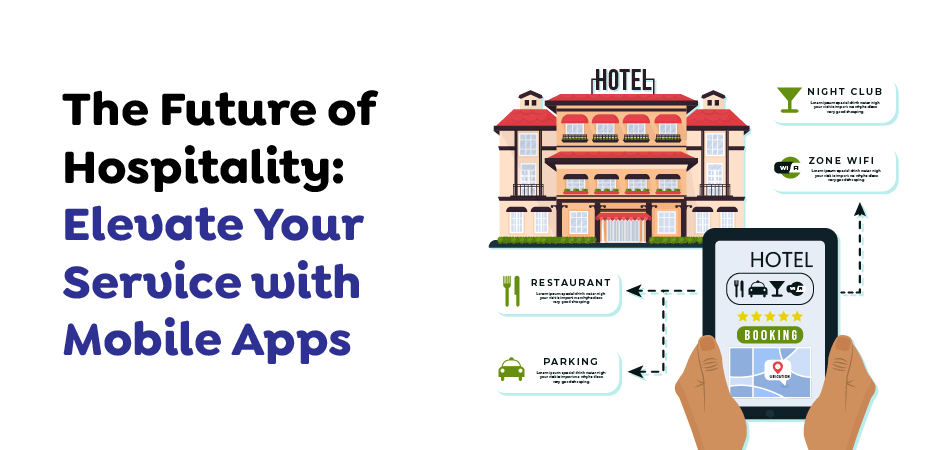
The rise of mobile apps has significantly changed the ways hotels communicate with their guests, handle reservations, and offer services. Initially, hotel applications served only as information tools, providing information on facilities, rooms, and even contact information. However, as technology advances, they have developed into various platforms catering to hotel management software aspects.
Also Read : Here’s How Hotel Management System Software is Shaping the Hospitality Industry!
Mobile applications have been essential in improving the guest experience overall. From easy check-ins to seamless checkouts to personalizing room preferences, guests can have an effortless and comfortable vacation using these applications. In addition, the in-app features such as Virtual concierge service, local guides, and instant messaging channels help increase customer satisfaction.
The integration of mobile applications in Hotel Management System Software has simplified reservation processes. Hotel guests can easily book rooms or make modifications to reservations and can even pick certain types of rooms using easy-to-use interfaces.
Also Read : The Ultimate Guide to Hospital Inventory Management Software Development
As a result of the significant global incidents, such as the COVID-19 disease, the significance of using contactless technology has increased. Mobile applications have played crucial roles in facilitating checkouts, check-ins, and payments, thus ensuring the safety and security of guests and hotel personnel. These features are now essential to hotels’ commitment to hygiene and health standards.
Hotel apps are helpful not only for guests but also help streamline the operations of hotel employees. Options like mobile check-in and checkout can reduce the time front desk staff spend. This allows personnel to concentrate on providing the best service possible instead of administrative duties. In addition, apps facilitate employee interaction, ensuring that requests or questions are answered promptly and effectively.
Also Read : Developing Your Own Self-Check-In Hotel Booking App: A Comprehensive Guide
Furthermore, hotel apps provide the potential for revenue creation in addition to room reservations. With in-app purchases like upgrading, restaurant reservations, spa treatments, and local excursions, hotels could enhance their revenues from other ancillary sources and provide additional convenience for customers. Additionally, personal recommendations and offers within the app could encourage users to spend more money during their visit.
In addition to guest interactions Beyond guest interactions, mobile applications contribute to productivity for staff at hotels. Housekeeping personnel can be provided with immediate updates regarding room conditions and requirements. Maintenance issues are reported quickly via the app. The connectivity level is optimized for internal communications, resulting in better and faster hotel operational efficiency.
Most hotels’ apps have loyalty programs that allow guests to earn points, get discounts, and access special offers. These programs don’t just boost guests’ loyalty but also effectively act as marketing instruments. Push notifications and targeted offers can be customized according to guests’ preferences. This creates an immediate avenue for hotels to connect with guests and build their brand’s loyalty.
Mobile applications can provide important data analysis and valuable insights to hospitality firms. They make it possible to observe user behavior, measure engagement metrics, and get actionable insight into guest trends and preferences. By analyzing patterns in app usage and customer feedback, hotels can improve services and make data-driven choices to improve the overall customer experience. Through access to live data and analytics, businesses can remain flexible and adaptable to changing customer demands and market conditions.
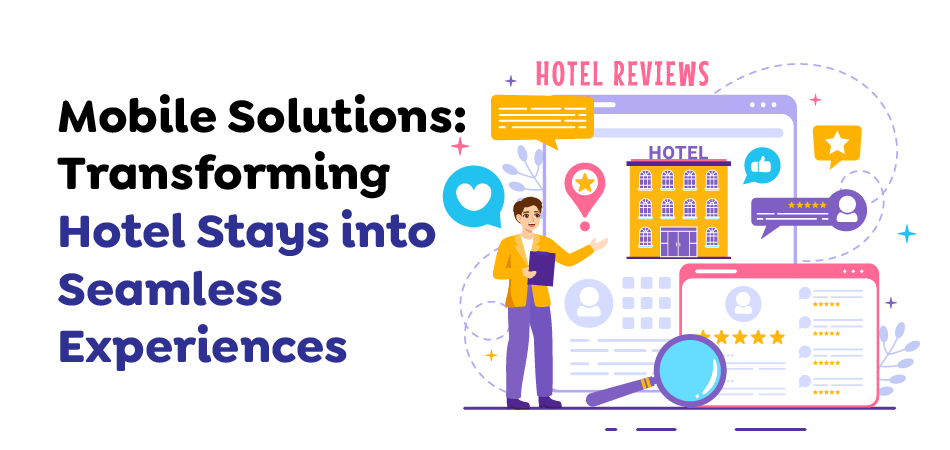
You are likely aware that hospitality and tourism are rapidly growing service sectors. Since they depend on acquiring more customers in a minimum period, applying new technology solutions to promote the business is essential. That’s why smartphones and their mobile applications come into play!
Mobile phones have been our go-to travel companion on journeys for leisure, business, or even life-changing trips in search of our own. Therefore, the apps on these phones serve as a bridge that can bring your company’s products and services to consumers who would be interested in them.
For success in the hospitality industry, you must be constantly on top of your game and ready to address your clients’ needs whenever needed. However, it isn’t easy to personalize your interactions with all potential customers and provide services that meet their needs. Introducing one customized app to your hospitality brand can help make this possible.
Mobile apps can collect a large amount of data about customers’ behavior to aid you in understanding their preferences. This will allow your business to build a stronger connection with the client by understanding their travel preferences and how they dress.
Mobile applications can help by collecting information from clients about events or items that appeal to them most when they stay at your hotel, restaurant, or other establishments. This will give you details and the opportunity to influence their future use of apps with promotions based on their previous experiences with hospitality.
The pop-up notifications and push notification options are a part of the features offered, along with creating an app specifically for your sector to facilitate your interactions with clients. The predictions derived from this customer usage information could help determine what services you provide are the most or least popular with your clients. It is possible to use the data to ensure the high standard of your services that are highly demanded or to make improvements upon those that show the most minor popularity.
Also Read : Get Your Customers Back to Action with These Push Notification Trends
It would be quite a headache when customers begin contacting the hospitality staff, asking them nitty-gritty but essential questions regarding your services. For instance, are the hotel rooms pet-friendly? Are your buses equipped with an inside toilet? Do you offer vegan-friendly options in your establishment?
The top Mobile App Development Company in UK can help you create an app on mobile for your business that is customized to highlight the offerings your company can provide and the terms and conditions that go with them. The apps will provide all pertinent details to customers and answer any doubt they have in mind. It will not just help make information about your hotel brand more easily accessible. Still, it will also enhance its credibility since a trustworthy source supplies it.
Altering the scenario above by taking care of millions of calls needing clarification about service. What do you think you would decide if the vast majority of calls you answered during the day came from travelers from abroad who did not have a language you are familiar with? Would you be content to lose clients due to the simple miscommunication? It would indeed be no!
Also Read : Navigating The Impact of AI-Powered Apps on eCommerce Stores in UK
Each customer counts as an asset to the business of hospitality. If you lose one, you’re voluntarily transferring one of your customers to another competitor. These inconveniences could be prevented by introducing mobile applications to help your company. Customers can easily switch different languages to suit their needs using multilingual functions in your mobile application.
It would help facilitate your company’s development to an expanded audience, specifically people uncomfortable with English as a common language. Your services offered via your application would be appreciated by both local and international visitors for their ease of use and for demonstrating equality across different cultures and societies.
Mobile applications are an individual platform for marketing your products and services. They eliminate advertising for similar offerings from other companies and help keep your client’s attention on what you provide.
Additionally, you can implement different marketing techniques inside your app to help promote new services that you have developed within the business. Examples include posters and video ads as images that convey information regarding new deals. Flash sales with discounts on services that aren’t demanded can be advertised via apps to boost visitors to the product. It will not just help promote the service. Still, it could also assist in avoiding losses caused by its possible insufficient use.
Also Read : Holiday Mobile App Marketing Tips, You Must Check Out
Using a mobile application to cover all areas and products you offer as part of your hotel brand can create not personalized elements of your user experience. The hospitality industry relies on keeping in touch with customers and incorporating chatbots to personalize your company’s mobile application.
Customers will feel connected during the booking process and use your services. Chatbots can eliminate the anxiety of not being able to get assistance in case of mistakes made by clients due to technical issues or other problems. Integrating chatbots into your mobile app will provide users with a step-by-step automated assistance system for clients who require assistance.
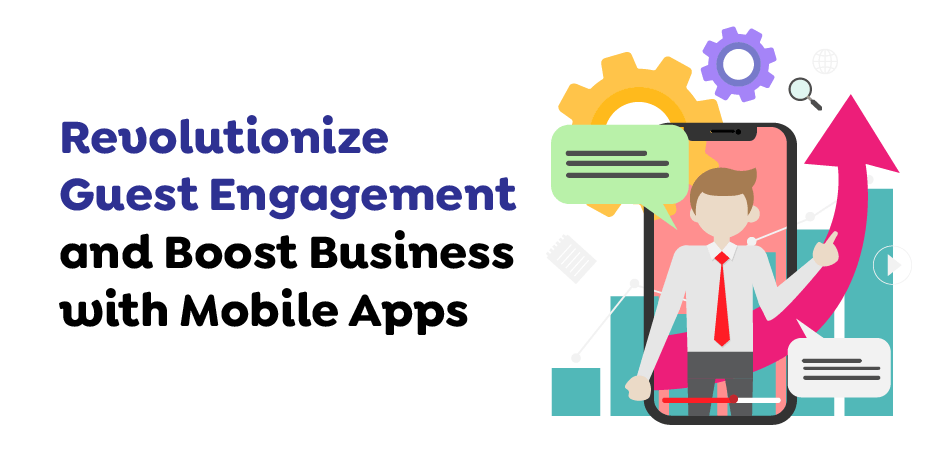
Do you tire of being just another individual in the crowd whenever you enter an establishment? Well, fret no more! The ultimate traveling companion has come to the market via mobile applications. They are changing how hotels interact with guests and provide the most personalized experience ever before.
Imagine that you’ve just had an exhausting day of travel. All you’re hoping for is an easy check-in procedure. Using mobile apps, you can avoid those long waits at the front desk and immediately go to your hotel room. Just download the hotel’s application and complete the check-in procedures, and then it’s done! Your smartphone will be your passport to your hotel room.
However, that’s not all. Mobile apps have various options to increase guests’ involvement during their time. Are you looking for recommendations on nearby places to visit or dining establishments? Are you looking to schedule the perfect spa treatment or reserve tables in the hotel’s famous restaurant? Just a couple of taps away. These apps serve as your concierge, taking care of your every need and ensuring you have a wonderful vacation.
Also Read : Mobile Apps Enhancing Healthcare Services in the UK
Guests can also receive real-time alerts about special promotions, such as events and offers in the hotel. Be it a cocktail evening at the bar or a pool yoga class, you’ll not miss opportunities to maximize your stay. Mobile applications keep you in the loop by giving you valuable information within reach.
Additionally, they create an atmosphere of belonging for the guests. These apps often have social functions that let travelers connect with one another, exchange memories, and arrange outings. It’s like having an inbuilt travel companion who shares your interests and can guide you to the best-hidden treasures of the destination.
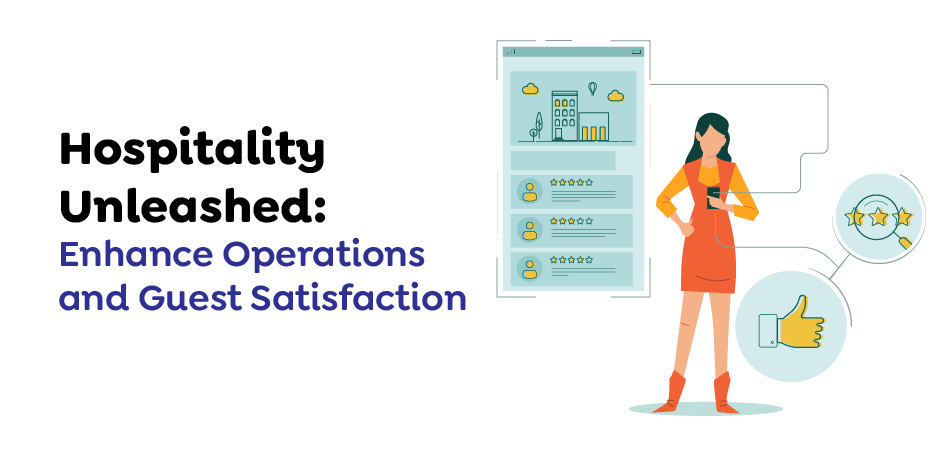
The major challenges facing the hospitality industry’s digital transformation consist of the need to improve customers’ experiences. The issues of integrating the latest technologies into complicated operations, and the requirement to adapt to consumers’ changing habits. The hospitality industry is highly competitive. Businesses are constantly innovating and investing in the latest technologies to enhance customers’ experiences and keep ahead of competitors. However, this can be challenging because intricate processes mark the business, and the integration takes time.
Furthermore, the hospitality business is experiencing massive disruptions because emerging technologies like booking websites and mobile applications transform how customers plan and book their trips. These have led to changes in consumer demand and created new opportunities and difficulties for hospitality businesses. In addition, the hospitality industry relies heavily on technology. Meeting these challenges is essential to success with digitization in the hospitality industry.
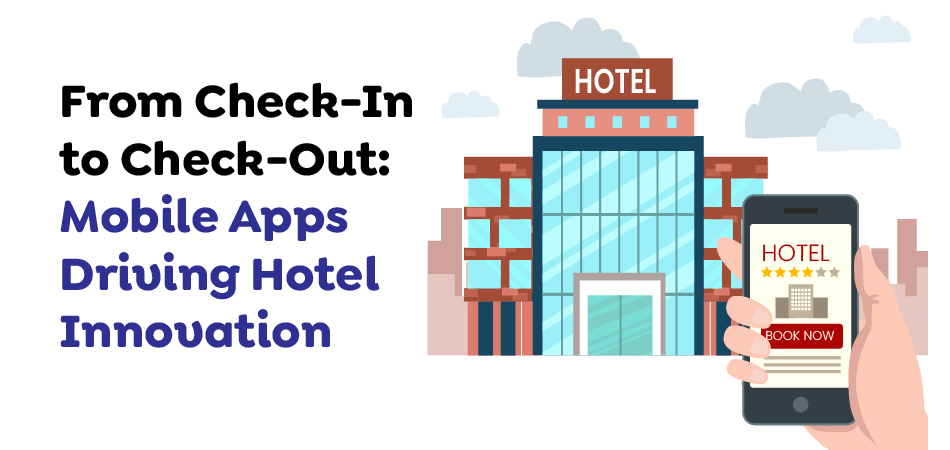
Here are the latest technology trends for mobile for the hospitality sector.
Mobile-enabled check-ins are the most popular trend in the hotel industry. Mobile check-ins permit travelers and guests to travel to hotels via mobile phones. Check-in and the required paperwork are performed on the phone, which saves time and money for the hotel.
Chatbots have been a staple of the hospitality industry. Hotel managers use chatbots to provide details to guests. With the advancement of technology, chatbots are being upgraded with Artificial Intelligence technology. Hoteliers are deploying AI-powered chatbots to improve the guest experience and provide precise and relevant information to travelers and guests.
Also Read : Healthcare Chatbots: Promising a Patient Care Industry Transformation or a Failure?
In the hotel industry, Big Data is usually related to customer behavior and interaction. Hoteliers utilize big data to predict and uncover key trends and patterns and make the right decisions based on data. Big Data helps hotel owners improve room rates and marketing strategies and improve customers’ experience (by using guest feedback). It also helps in making decisions about offering new services or removing services that are no longer needed and analyzing competitor data.
Since its introduction, Blockchain has quickly become a prominent technology within the hospitality industry. Key companies in the hospitality sector were constantly challenged with storing guests’ data and protecting their guests from cyber-attacks. Blockchain is a safe ledger that stores guests’ precious data. It’s almost impossible to penetrate. In addition, Blockchain also unlocks an alternative payment method that permits hotels to take payments from cryptocurrencies, including Bitcoin, Dogecoin, Ethereum, and others.
Also Read: How has Blockchain Helped a Gaming Platform Become a Game Changer?
Many guesthouse and hotel owners now employ voice search and technology to control their voice for guests’ ease. They’ve installed smart appliances in their rooms. They allow guests to control lighting, thermostats, and blinds. They can also request room cleaning or service, giving guests a modern and seamless room experience.
Also Read : Voice Search Technology: Significant Impact on Mobile App Development!
In the hospitality industry, the Internet of Things is used to serve a variety of purposes. In the hospitality industry, the Internet of Things is a network that connects a variety of appliances and devices via the Internet, allowing devices to transmit and receive information. The Internet of Things will enable users to control many of the features in the room, like the temperature of air conditioners or ventilation, as well as lights via their mobile phones. In addition, IoT has replaced physical keys and keys. IoT lets users utilize their smartphones as digital keys to lock and open doors.
Today, Tech Lounges are a trend emerging in the hospitality sector worldwide. Hotels have begun to provide guests with Tech Lounges, also known as Tech Lounges. These lounges are outfitted with additional amenities such as working spaces for presentations, professional workstations, immersive golf experiences, and conference rooms. Tech Lounges truly bridge the divide between professional and personal excursions.
Augmented Reality and Virtual Reality are other technologies employed in hospitality and tourism. Hotels and resorts utilize AR/VR solutions that give prospective guests a virtual tour of their facilities, such as gyms, rooms, eating areas, and swimming pools. Hoteliers have also implemented menus with AR technology that describe the dishes served and provide the highest nutrition quality. Additionally, many well-known hotels offer VR games in their lounges for entertainment.
Also Read : Benefits Of Building A VR App For The Travel And Tourism Sector
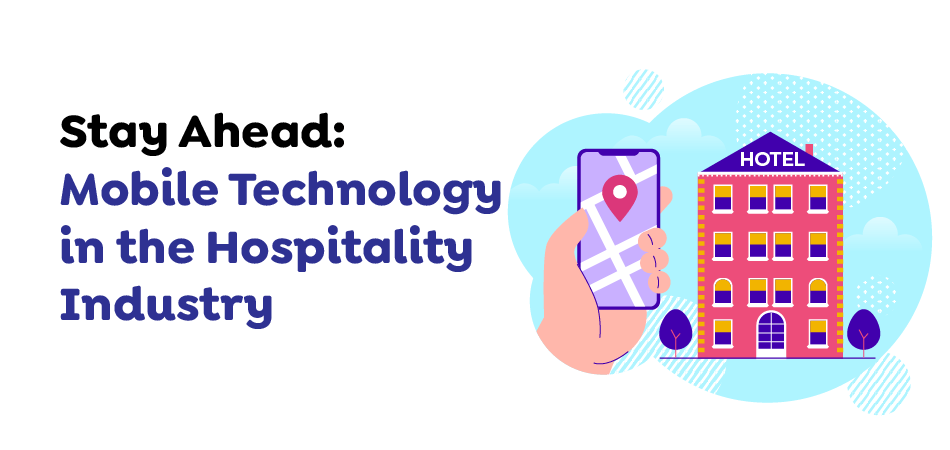
Using mobile apps to promote your company’s business within the hospitality sector has more benefits than cons. Developing a mobile app will guarantee a continuous connection with your clients. Incorporating mobile apps into guest accommodations results in a strong feedback loop in which each feature is built upon the previous. Each feature mentioned above is not just used to fulfill its goal. Still, it also supports and improves the performance of others.
Features like mobile check-in and room keys naturally draw users to the application, making it more likely for them to explore different offerings available on the app. If guests get more engaged in the app, they are more likely to come across relevant content tailored to their needs and recommendations specific to them. Creating a mobile application for the hospitality industry doesn’t just mean installing features individually. It’s about providing a seamless experience in which each feature enhances the others.
Get in touch with our team at Techugo to bring your dream project to life effortlessly.
Write Us
sales@techugo.comOr fill this form